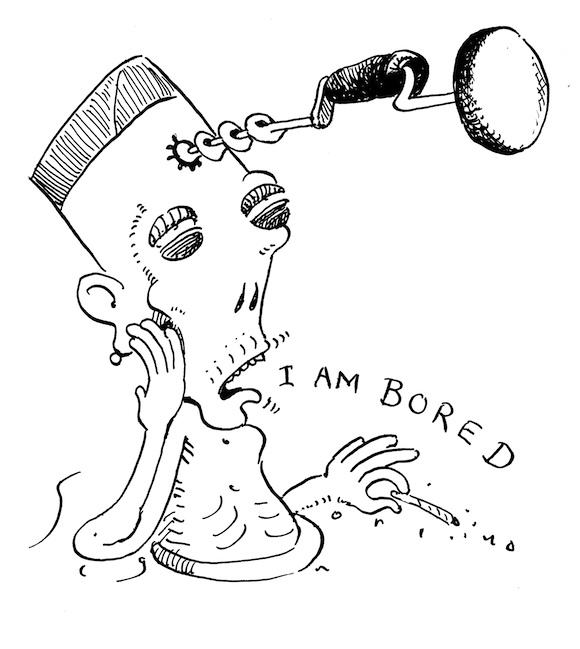 Is there a scientific explanation for the phenomenon of boredom? Can you be bored to death? — Thomas M.
Is there a scientific explanation for the phenomenon of boredom? Can you be bored to death? — Thomas M.
[hr_dotted]
There’s no good explanation for boredom, at least not one that’s generally agreed on. However, while it’s unlikely you can be bored to death in the sense that sixth-graders imagine, boredom may indeed result in your premature extinction — possibly by your own hand.
We know this because of a fellow known to science as Mansur Zaskar, whose strange tale was reported in the clinical literature a mere 13 years ago. Mansur, who emigrated from Pakistan to Canada as a child, had twice tried to commit suicide because, he said, he was too bored to live. Here’s a quote:
“I feel like I’m not alive in this moment in time, as if I am a spectator to life and to myself. I feel detached from others around me. I feel I lack a sense of purpose, and completeness. Most of all I feel extremely bored. Bored of everything. . . . No matter what the activity is it leaves me feeling unfulfilled. I’m bored of thinking, of talking, of feeling, bored with being bored. . . . What possible difference does it make whatever I do? . . . I wish so much that I could cease to exist, just vanish away.”
Your first thought: I’m glad I never went on any long fishing trips with this guy. Your second: There must have been something wrong with his brain chemistry — it sounds like he was clinically depressed.
If so, he was an atypical case. Mansur didn’t present or identify as being depressed, he didn’t get the right scores on the diagnostic tests, and antidepressant drugs had little or no effect. However, marijuana temporarily cured what ailed him, although it had the drawback of fogging his mind. In addition, his therapist informs us, “he also experimented with LSD and mushrooms. . . . The closest Mansur ever came to a sense of oneness with his friends was when using these drugs.”
In other words, whatever Mansur’s problem was, it responded to drug treatment. This suggests he may well have had a brain-chemistry issue — it just wasn’t depression.
That’s about all we know. Since at least the mid-1980s psychiatrists have posited boredom as a state related to but independent of depression and tried to gauge patients’ predisposition to it . But there’s no agreement about what’s going on here, or even what boredom is. Theories about boredom fall into several categories:
- Psychodynamic. You’re bored because you don’t know what you want, and you don’t know what you want because you’ve repressed it. So you search for what you want without hope of finding it.
- Attentional.You can’t focus on what you want, so you never get it.
- Sub-optimal arousal. You want a lot of mental stimulation, but the world only gives you a little.
- Existential. Your life is without meaning or purpose, which sounds like Mansur syndrome. However, another possibility is:
- Dissociative disorder. You feel numb, detached from your self and your surroundings. Some might call this a psychodynamic problem — specifically, a reaction to trauma — but I say it’s chemicals.
Even for those without a terminal case, boredom can lead to health problems. A study of 7,500 British civil servants found those who were bored most of the time were 2.5 times more likely to die of cardiovascular disease than those who weren’t. The researchers speculated that those who were bored might be more likely to smoke, drink, or do drugs. Other studies have connected greater cardiovascular and stress-related risks to boredom.
Boredom is associated with antisocial behavior, alcohol abuse, pathological gambling, and poor interpersonal relationships. Bored teenagers and college students are more likely to abuse alcohol. For some people who suffer from serious mental illness, boredom can worsen their symptoms and disrupt their recovery. In one case, a patient evidently conjured up hallucinations as a way to cope with boredom. Boredom can also contribute to poor driving habits: one study finds the easily bored have many more close calls on the road.
As the preceding suggests, those prone to boredom have a tendency to self-medicate. A survey of 845 intravenous drug users found a third had been seriously bored in the previous week, and while so afflicted had engaged in self-destructive behavior such as selling drugs or trading sex for money or drugs. Moreover, those who were both bored and depressed were much more likely to engage in HIV-risky behaviors than those who were bored or depressed but not both.
And yet I can’t say boredom is all bad. Thirteen years ago, my assistant Fierra, bored to distraction at work, typed “bored” into a search engine and found the Straight Dope and eventually her future wife, my assistant Una. While it would be presumptuous to say they’ve lived happily ever after, they seem pretty chipper so far. Then again, they’re my assistants, and anyone who can profess boredom while shooting bacon with lasers is beyond help.
— CECIL ADAMS
Send questions to Cecil via straightdope.com or write him c/o Chicago Reader, 350 N. Orleans, Chicago 60654. Subscribe to the Straight Dope podcast at the iTunes.
